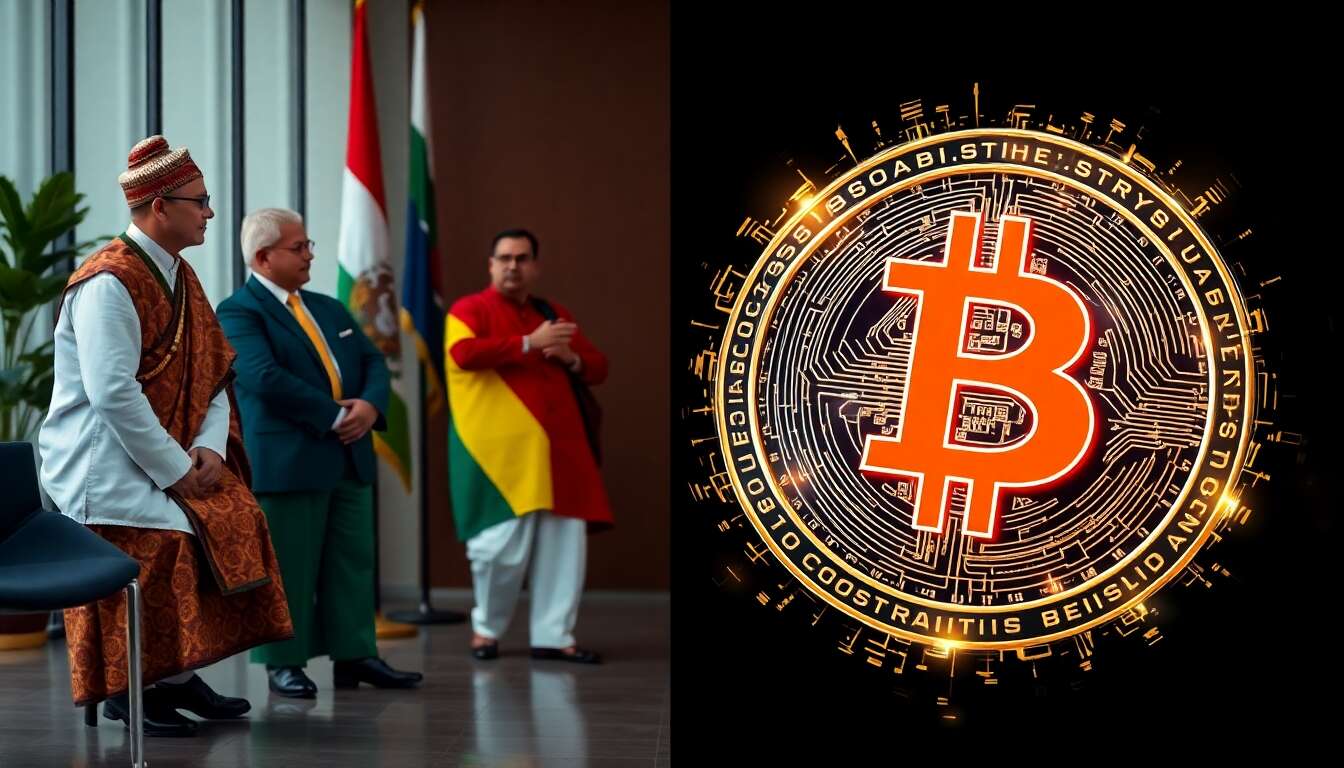In the realm of international finance, emerging economies are vying for a more substantial role. This ambition is epitomized by BRICS—comprising Brazil, Russia, India, China, and South Africa. These nations, with their combined economic prowess, are challenging the role of the US dollar as the world’s primary reserve currency. The emergence of Bitcoin further complicates this dynamic, offering potential benefits and challenges. Let us explore how these factors intersect and what implications they might bear on the global financial landscape.
Le contexte économique des BRICS

The Formation and Expansion of BRICS
BRICS originated with a vision to foster cooperation among five major emerging economies: Brazil, Russia, India, China, and South Africa. This bloc was designed to challenge the established economic order dominated by Western powers. Over time, BRICS has expanded to include countries like Egypt, Ethiopia, Iran, Saudi Arabia, and the UAE, signaling its growing influence in the global arena.
Economic Influence and Potential
The BRICS nations collectively boast a diverse array of economic strengths. They possess significant natural and human resources, vast consumer markets, and technological advancements. Together, they represent a substantial portion of global GDP, placing them as formidable players on the world stage. Recent statistics show that BRICS outpaces the G7 in terms of purchasing power parity.
A New Power Paradigm ?
As BRICS continues to evolve, it advances the notion of a multipolar world, resisting a unipolar system dominated by a single economic power. This context sets the stage for an exploration of one of BRICS’ strategic goals: the reduction of reliance on the US dollar. Understanding this mission is crucial to deciphering the bloc’s future moves.
Les enjeux de la dé-dollarisation pour les BRICS
The Strategic Rationale for De-Dollarization
BRICS countries aim to minimize their dependency on the US dollar due to geopolitical considerations and the desire for economic sovereignty. The dollar’s dominance in global trade has long positioned the United States as a central player in international finance, granting it significant influence. By seeking alternatives, the BRICS nations aspire to recalibrate the balance of power.
Challenges in Reducing Dollar Dependence
Shifting away from the dollar is no minor feat. The currency is deeply ingrained in the fabric of international transactions, from petroleum sales to global reserves. The intricate web of dependencies and existing financial structures presents a formidable barrier to change. Furthermore, factors such as currency volatility and liquidity constraints pose challenges to realizing this ambition.
Current Efforts and Initiatives
To combat these obstacles, BRICS has initiated proposals such as a new currency bolstered by digital means that could bypass the dollar. These discussions emphasize the necessity of collaboration among member nations. Now, the attention turns to innovative financial tools, namely digital currencies, to achieve these objectives.
Introduction des monnaies numériques soutenues par l’or
The Concept of Gold-Backed Digital Currencies
In the pursuit of stability and trust, BRICS contemplates the introduction of digital currencies backed by gold. This concept aims to merge the traditional reliability of precious metals with modern fintech advancements. Such a currency could serve as a more stable alternative within volatile markets.
Benefits of Combining Gold with Digital Solutions
Gold has been a longstanding store of value, revered for its inherent worth and limited supply. Integrating gold with digital currencies could enhance credibility and reduce adverse fluctuations associated with traditional fiat currencies. This hybrid form could appeal to investors and nations alike, currently wary of the unpredictability of conventional financial systems.
Digital Innovations and Risks
The introduction of these currencies necessitates enormous technological infrastructure and cybersecurity measures. Ensuring secure digital transactions and safeguarding against potential threats remain paramount. As BRICS navigate the path of digital innovation, the next logical step is to examine how existing digital solutions like Bitcoin and stablecoins could integrate into their strategy.
Bitcoin et stablecoins : opportunités et défis pour les BRICS
Advantages of Bitcoin Adoption
Bitcoin, a decentralized digital asset, offers autonomy from centralized monetary authorities. For BRICS nations, it presents opportunities to bypass traditional financial constraints and conduct trade independently of established banking systems. However, the implementation of Bitcoin within BRICS necessitates addressing prevailing challenges.
Obstacles and Considerations for Bitcoin
- Volatility: Bitcoin’s price can fluctuate dramatically, affecting its viability as a stable means of exchange.
- Regulation: Differing regulatory approaches among BRICS nations can complicate cohesive adoption strategies.
- Infrastructure Needs: Establishing a robust financial infrastructure to support Bitcoin transactions is essential.
The Role of Stablecoins
Stablecoins, digital currencies pegged to tangible assets like fiat currencies, could offer a more stable alternative. They mitigate Bitcoin’s volatility while providing the digital transaction capabilities necessary for modern trade. As BRICS explore these possibilities, they must also consider the broader implications for the global financial system.
Impacts potentiels sur le système financier mondial
Challenging the Dominance of the Dollar
Should BRICS successfully integrate alternative currencies, it might prompt a substantial shift in global financial dynamics. The reliance on the US dollar as the world’s reserve currency could diminish over time. Such a scenario would test the resilience of current economic alliances and provoke reevaluations of established monetary policies.
New Roles for Emerging Economies
The adoption of digital currencies allows BRICS nations to play more proactive roles in shaping the future of global trade. They could set precedents for digital currency implementations and create new financial partnerships. This increased influence might also invite greater scrutiny and create competition among emerging markets.
Seeking a New Global Balance
The potential redistribution of financial power calls into question the current hierarchy of global economies. While these developments could promote equitable growth, they also pose risks of destabilization if not managed carefully. As BRICS ventures into facilitating cross-border payments, the implications of these financial innovations become more pronounced.
Les projets des BRICS pour les paiements transfrontaliers

Streamlining International Transactions
Efficient cross-border payments remain critical for global commerce. BRICS aim to leverage digital currencies to enhance transaction speed and reduce costs. By streamlining these processes, member countries can foster intra-bloc trade and reduce reliance on external financial intermediaries.
Technological Developments and Collaborations
Collaborative efforts to develop the necessary technology infrastructure are underway. These initiatives include building robust payment systems that can handle real-time transactions securely. Partnerships with fintech companies and other nations enhance these capabilities, broadening BRICS’ reach in global trade.
Challenges in Implementation
Ensuring compatibility and efficiency across such diverse economies presents challenges. Varied regulatory environments and technological readiness levels may impede progress. Nonetheless, successful implementation could establish BRICS as leaders in digital finance, necessitating a closer examination of Bitcoin’s role versus BRICS’ proposed digital asset.
Comparaison entre bitcoin et le nouvel actif numérique des BRICS

Bitcoin versus BRICS Digital Asset
| Aspect | Bitcoin | BRICS Digital Asset |
|---|---|---|
| Volatility | High | Potentially Lower due to Gold-backing |
| Centralization | Decentralized | Likely part of BRICS governance |
| Acceptance | Globally Increasing | BRICS Specific, with Expansion Potential |
| Technological Requirements | Blockchain Infrastructure | Digital Payment Systems and Gold Integration |
Evaluating Practicality and Suitability
The selection between Bitcoin and BRICS’ digital asset depends on multiple factors, including the geopolitical landscape, economic agendas, and technological needs. While Bitcoin offers decentralization, a central BRICS digital asset could provide greater stability and governance.
Potential Outcomes of Adoption
Choosing the suitable currency could redefine trade relationships and boost economic sovereignty. Each option holds distinct advantages and challenges, influencing the trajectory of global currency frameworks. This decision could also impact the broader future of the US dollar in world economies.
Scénarios possibles pour l’avenir du dollar américain
Pathways of Currency Evolution
The potential rise of BRICS’ digital currency introduces scenarios where the US dollar’s dominance is re-evaluated. As BRICS consider alternative financial strategies, the forthcoming changes could alter the expected roles of major currencies. This underscores the importance of strategic planning and adaptation among global powers.
Effects on Dollar as a Reserve Currency
If the dollar loses its status as the primary reserve currency, the United States may face significant economic implications, including shifts in inflation, interest rates, and geopolitical influence. Conversely, diversification away from the dollar could grant more stability to international finance.
Future Strategies and Considerations
Policy and decision-makers must contend with these evolving dynamics and potentially pivot strategies to maintain their economic standing. This period of transformation could redefine how nations engage in trade and manage their monetary systems, setting the stage for a novel era in global finance.
The exploration of BRICS versus Bitcoin reveals an intricate tapestry of economic ambition, technological innovation, and strategic recalibration. As nations move towards digital currencies, the reshaping of international finance appears inevitable. Whether these changes reinforce existing structures or yield a new order, the pursuit of alternatives like Bitcoin and gold-backed currencies showcases an evolving narrative in the world’s economic dialogue.



